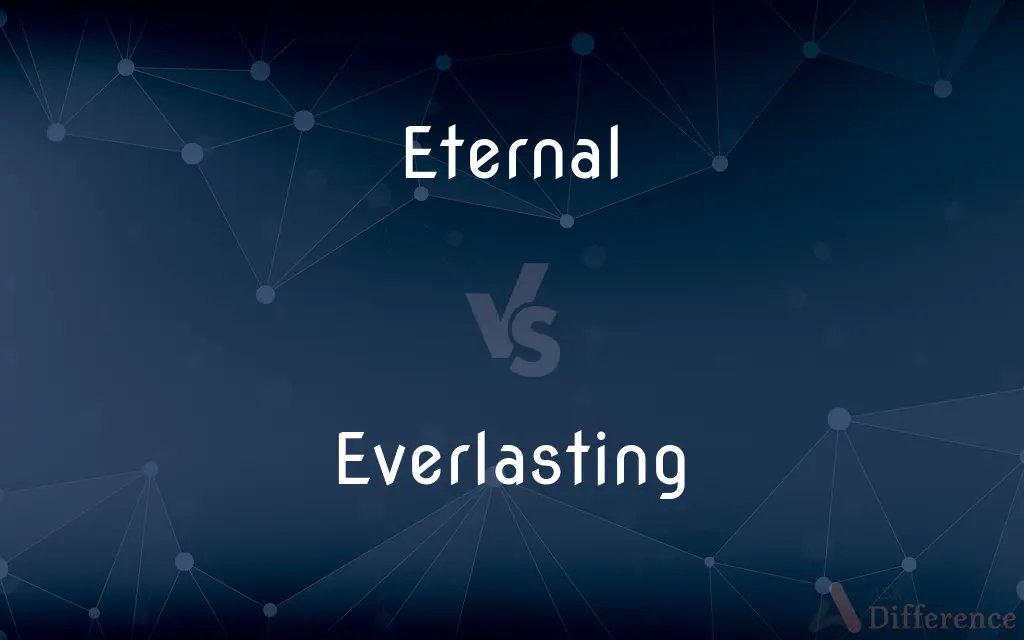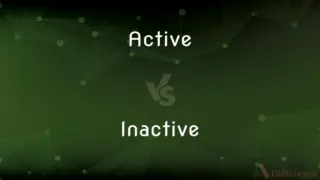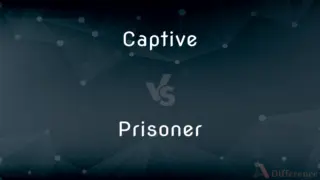Eternal vs. Everlasting — What's the Difference?
Edited by Tayyaba Rehman — By Maham Liaqat — Updated on March 15, 2024
Eternal implies infinite duration without beginning or end, while everlasting may suggest a very long duration but not necessarily without end.

Difference Between Eternal and Everlasting
Table of Contents
ADVERTISEMENT
Key Differences
Eternal is often used to describe something that exists outside of time, suggesting an infinite duration that neither begins nor ends. For example, many religions refer to their gods as eternal beings, indicating their timeless existence. Everlasting, on the other hand, generally refers to something that lasts for a very long time, possibly until the end of time, but doesn't explicitly deny a beginning. It's frequently used in contexts where the emphasis is on the unending nature of something within the framework of time, such as everlasting love or everlasting life.
While eternal emphasizes timelessness and the absence of both beginning and end, everlasting focuses more on the concept of enduring through all time. Eternal can suggest a quality of being that is immutable and unchanging, reflecting a state that is beyond the temporal world. Everlasting, whereas, might imply continuation within the temporal realm, enduring through changes and across ages.
The application of eternal and everlasting can also differ in philosophical and theological discussions. Eternal is a term of choice in philosophical debates about the nature of the universe, time, and existence, underscoring the idea of perpetual existence beyond temporal limitations. Everlasting, whereas, is often found in religious texts and discussions, suggesting a promise or a condition that extends beyond the human understanding of time.
In literature and poetry, eternal is used to evoke a sense of the sublime, the transcendent, or the divine, enhancing themes of immortality and timelessness. Everlasting, on the other hand, is employed to express deep, enduring emotions or states that, while incredibly long-lasting, are often more grounded in human experience and the physical world.
Eternal and everlasting share common ground in their denotation of long duration, yet they diverge in their connotations and typical contexts of use. Eternal suggests an absence of temporal boundaries altogether, while everlasting implies a relentless continuation within time.
ADVERTISEMENT
Comparison Chart
Duration
Infinite, without beginning or end
Very long, but may have a beginning
Context
Philosophical, theological, metaphysical
Religious, literary, emotional
Connotation
Timelessness, unchanging
Long-lasting, enduring
Application
Describes concepts or entities outside of time
Describes enduring states or entities within time
Example Use
Eternal truths; the eternal universe
Everlasting love; everlasting peace
Compare with Definitions
Eternal
Timeless in quality or nature.
The eternal beauty of classical art captivates every generation.
Everlasting
Never coming to an end; enduring.
Their everlasting love was celebrated by all who knew them.
Eternal
Beyond temporal limitations.
The eternal soul transcends physical existence.
Everlasting
Continuing indefinitely or for a very long period.
The story of their everlasting friendship inspired many.
Eternal
Infinite in time.
The stars seem eternal to the human eye.
Everlasting
Existing for a long duration, through ages.
The everlasting hills have witnessed the history of the earth.
Eternal
Existing without a beginning or end.
The concept of an eternal universe challenges the notion of creation.
Everlasting
Persisting without apparent end.
The quest for everlasting peace is a noble endeavor.
Eternal
Unchanging and perpetual.
Eternal principles of justice guide moral societies.
Everlasting
Lasting for an indefinitely long time.
The everlasting light of the lighthouse guided sailors home.
Eternal
Being without beginning or end
Belief in an eternal creator.
Everlasting
Lasting forever; eternal.
Eternal
Continuing without interruption; perpetual
Earned my eternal gratitude.
Everlasting
Continuing indefinitely or for a long period of time.
Eternal
Seemingly endless; interminable
Eternal waiting at the airport.
Everlasting
Persisting too long; tedious
Everlasting complaints.
Eternal
Something timeless, uninterrupted, or endless
"Shall we speak of universals and eternals?" (Cynthia Ozick).
Everlasting
Everlasting God. Used with the.
Eternal
Eternal God. Used with the.
Everlasting
Eternal duration; eternity.
Eternal
Lasting forever; unending.
Everlasting
Any of various plants chiefly in the composite family, such as the strawflower, that retain their form and color long after they are dry. Also called immortelle.
Eternal
(philosophy) existing outside time; as opposed to sempiternal, existing within time but everlastingly
Everlasting
Lasting or enduring forever; existing or continuing without end
Eternal
(hyperbolic) Constant; perpetual; ceaseless; ever-present.
Everlasting
Continuing indefinitely, or during a long period; perpetual; sometimes used, colloquially, as a strong intensive.
This everlasting nonsense
Eternal
(dated) Exceedingly great or bad; used as an intensifier.
Some eternal villain
Everlasting
(philosophy) Existing with infinite temporal duration (as opposed to existence outside of time).
Eternal
One who lives forever; an immortal.
Everlasting
(colloquial) Extremely.
Eternal
Without beginning or end of existence; always existing.
The eternal God is thy refuge.
To know wether there were any real being, whose duration has been eternal.
Everlasting
An everlasting flower.
Eternal
Without end of existence or duration; everlasting; endless; immortal.
That they may also obtain the salvation which is in Christ Jesus, with eternal glory.
Everlasting
(historical) A durable cloth fabric for shoes, etc.
Eternal
Continued without intermission; perpetual; ceaseless; constant.
And fires eternal in thy temple shine.
Everlasting
Lasting or enduring forever; exsisting or continuing without end; immortal; eternal.
Eternal
Existing at all times without change; immutable.
Hobbes believed the eternal truths which he opposed.
What are the eternal objects of poetry among all nations, and at all times?
Everlasting
Continuing indefinitely, or during a long period; perpetual; sometimes used, colloquially, as a strong intensive; as, this everlasting nonsence.
I will give to thee, and to thy seed after thee . . . the land of Canaan, for an everlasting possession.
And heard thy everlasting yawn confessThe pains and penalties of idleness.
Whether we shall meet again I know not;Therefore our everlasting farewell take;Forever, and forever farewell, Cassius.
Eternal
Exceedingly great or bad; - used as a strong intensive.
Everlasting
Eternal duration, past or future; eternity.
From everlasting to everlasting, thou art God.
Eternal
One of the appellations of God.
Law whereby the Eternal himself doth work.
Everlasting
With the definite article) The Eternal Being; God.
Eternal
That which is endless and immortal.
Everlasting
A plant whose flowers may be dried without losing their form or color, as, the pearly everlasting (Anaphalis margaritacea), the immortelle (Xeranthemum anuum) of the French, the cudweeds, etc.
Eternal
Continuing forever or indefinitely;
The ageless themes of love and revenge
Eternal truths
Life everlasting
Hell's perpetual fires
The unending bliss of heaven
Everlasting
A cloth fabric for shoes, etc. See Lasting.
Eternal
Lasting for an indefinitely long period of time
Everlasting
Any of various plants of various genera of the family Compositae having flowers that can be dried without loss of form or color
Eternal
Tiresomely long; seemingly without end;
Endless debates
An endless conversation
The wait seemed eternal
Eternal quarreling
An interminable sermon
Everlasting
Continuing forever or indefinitely;
The ageless themes of love and revenge
Eternal truths
Life everlasting
Hell's perpetual fires
The unending bliss of heaven
Everlasting
Expletives used informally as intensifiers;
He's a blasted idiot
It's a blamed shame
A blame cold winter
Not a blessed dime
I'll be damned (or blessed or darned or goddamned) if I'll do any such thing
He's a damn (or goddam or goddamned) fool
A deuced idiot
Tired or his everlasting whimpering
An infernal nuisance
Everlasting
Lasting for an indefinitely long period of time
Everlasting
Without qualification; used informally as (often pejorative) intensifiers;
An arrant fool
A complete coward
A consummate fool
A double-dyed villain
Gross negligence
A perfect idiot
Pure folly
What a sodding mess
Stark staring mad
A thoroughgoing villain
Utter nonsense
Everlasting
Continuing too long;
Everlasting complaints
Common Curiosities
How is everlasting different from eternal?
Everlasting suggests a very long duration, possibly without end, but doesn't necessarily imply the absence of a beginning, unlike eternal, which denotes infinite existence beyond the concept of time.
How do eternal and everlasting apply to non-religious contexts?
Eternal can describe concepts, principles, or entities considered timeless or unchanging, while everlasting might refer to anything that lasts for an extremely long time, from emotions to physical objects.
Do eternal and everlasting have the same emotional impact?
Eternal often carries a heavier, more profound connotation due to its association with timelessness and infinity, while everlasting might evoke feelings of enduring love, hope, or faith within the human experience.
Can love be eternal?
In a poetic or philosophical sense, love can be described as eternal to signify a timeless, unchanging nature. In practical terms, this often translates to everlasting love, enduring throughout one's life.
What does eternal mean?
Eternal refers to something that exists without beginning or end, infinite in duration and unchanging over time.
Is the concept of eternal life the same as everlasting life?
In many religious contexts, they are used interchangeably to describe life after death that continues forever. However, eternal life might emphasize a quality of divine life beyond time, while everlasting life stresses continuity without end.
Is the universe eternal or everlasting?
This is a subject of philosophical and scientific debate. Some theories propose the universe is eternal, without beginning or end, while others view it as everlasting, existing for a very long time but potentially having a beginning.
How do artists convey the concept of eternal vs. everlasting?
Artists might convey eternal concepts through timeless, universal themes or symbols, whereas everlasting might be depicted through enduring landscapes, enduring human emotions, or continuous movement.
Can nature be described as eternal or everlasting?
Nature can be described as everlasting in its enduring presence and cycles, though some aspects or principles of nature might be considered eternal in their perceived unchanging truth.
Can something be both eternal and everlasting?
While the terms are often used interchangeably in casual conversation, philosophically and theologically, eternal emphasizes timelessness beyond temporal existence, whereas everlasting focuses on enduring through time.
Are there eternal truths?
Yes, eternal truths refer to fundamental principles or facts that are considered valid at all times, beyond cultural or historical contexts.
Is happiness eternal or everlasting?
Happiness can be considered everlasting when it refers to a long-lasting state of contentment, though some philosophical views might explore the concept of eternal happiness as a state of being beyond time.
Can human achievements be eternal?
Human achievements can be considered eternal in the sense that they have a lasting impact on society or culture, transcending time and generations, though physically, they are more accurately described as everlasting.
What is an example of something everlasting?
An example is everlasting peace, a concept or state that people strive to achieve indefinitely.
What does everlasting punishment mean?
Everlasting punishment refers to a punishment that lasts for eternity, often used in religious contexts to describe the fate of the wicked after death.
Share Your Discovery

Previous Comparison
Active vs. Inactive
Next Comparison
Captive vs. PrisonerAuthor Spotlight
Written by
Maham LiaqatEdited by
Tayyaba RehmanTayyaba Rehman is a distinguished writer, currently serving as a primary contributor to askdifference.com. As a researcher in semantics and etymology, Tayyaba's passion for the complexity of languages and their distinctions has found a perfect home on the platform. Tayyaba delves into the intricacies of language, distinguishing between commonly confused words and phrases, thereby providing clarity for readers worldwide.
















































